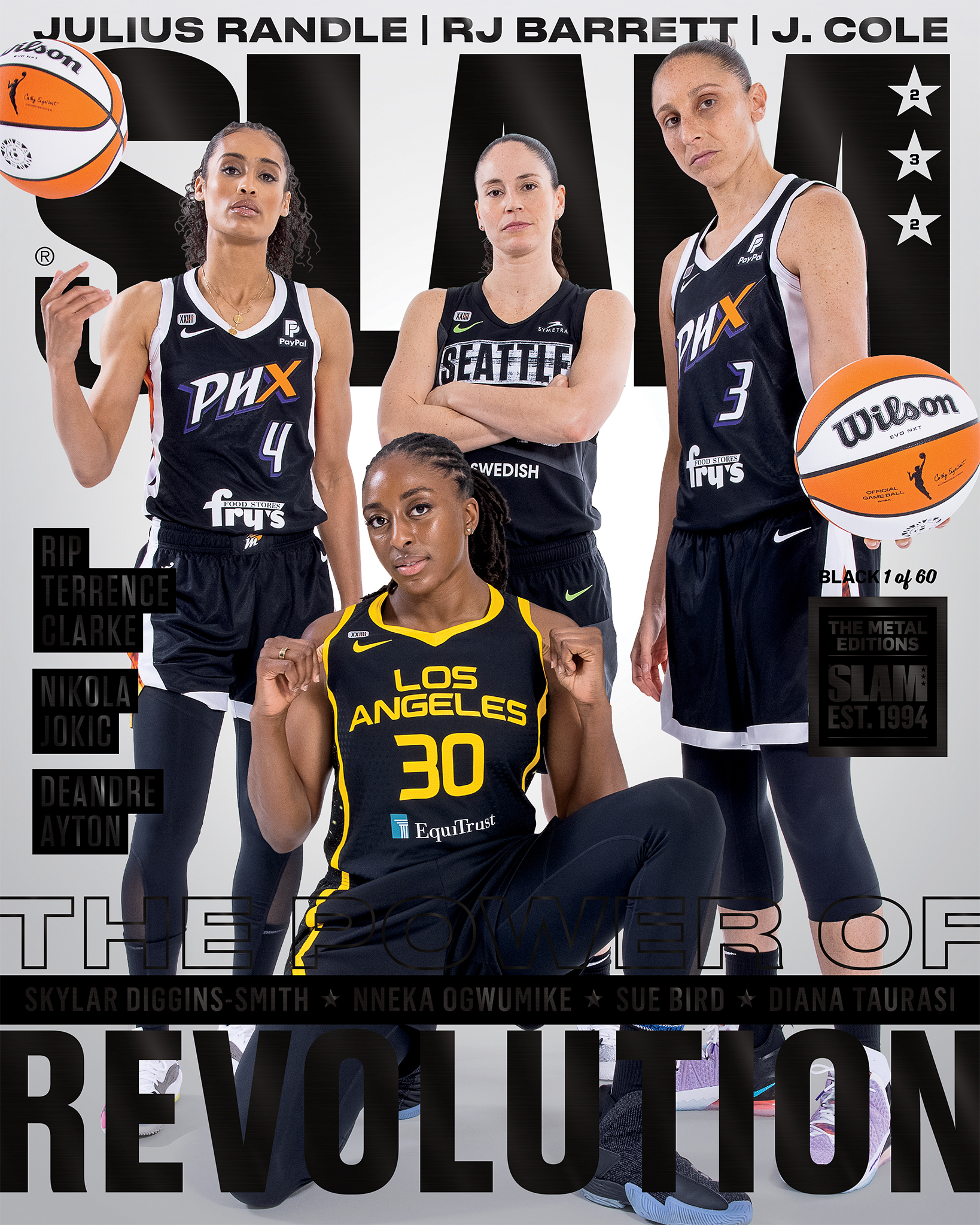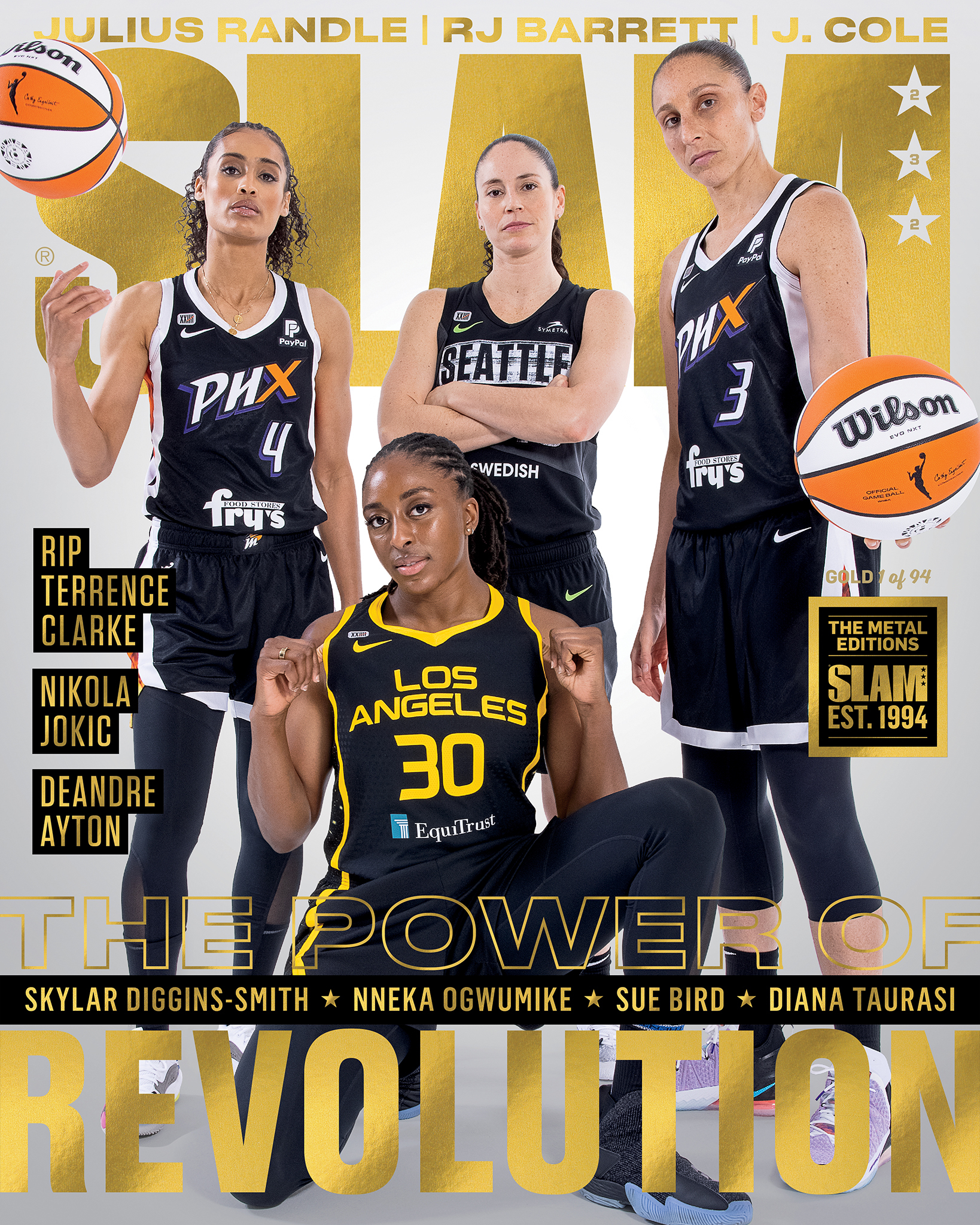Unity ‘Til Infinity: Skylar Diggins-Smith, Nneka Ogwumike, Sue Bird, and Diana Taurasi Cover SLAM 232
When the WNBA was first launched in 1997, its first well-known tagline was We Got Next. Twenty-five years later, the League is about to embark on a historic season as it celebrates its quarter of a century existence, and it’s no longer about We Got Next but We Got Now.
Sue Bird and Diana Taurasi joined the League a few years after its inception and have played critical roles on and off the court in putting it in the position it’s in today. Nneka Ogwumike joined some years later and has been crucial to the voice of the WNBPA and ensuring that the women who play on the court are heard on everything from basketball-related issues to social justice reform and much more. Skylar Diggins-Smith brought a new era of the game with her as social media flourished, and now she’s one of the most followed women’s professional athletes in the world.
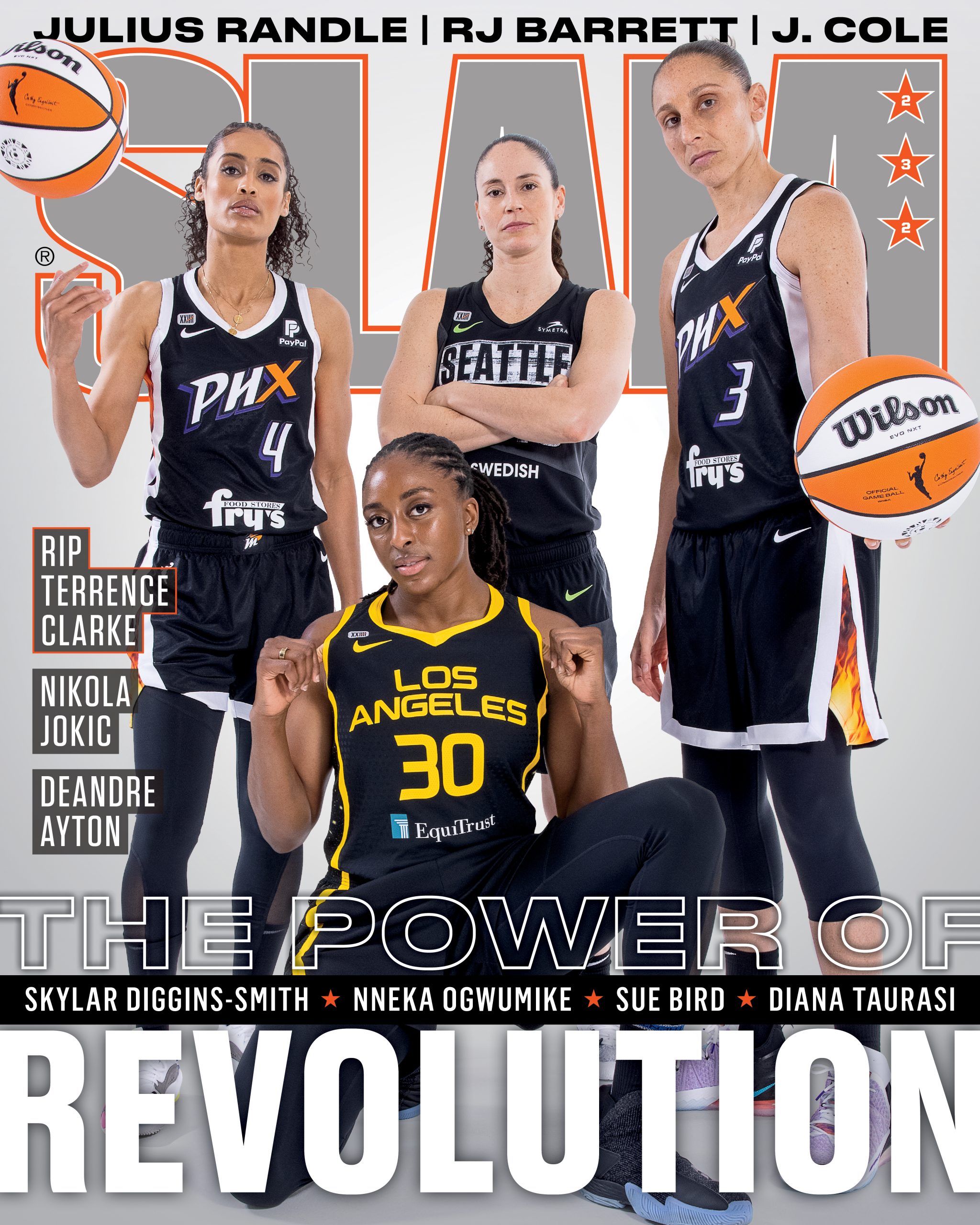
Each of these four real-life superheroes formed a revolution in women’s sports and helped evolve the game that we love for generations to come.
SLAM: Did you ever imagine yourself saying that you would be playing in the 25th season of the WNBA when you first picked up a basketball?
DIANA: No. I think you know growing up and being a 12-year-old and the WNBA just starting and living in L.A., going to Great Western Forum and seeing Lisa [Leslie] play and all of the visiting teams, it was shocking because I was only going to watch the Lakers and now I’m watching the WNBA. So that to me was kind of the beginning of, Oh, I kinda like this. There might be a future in basketball. But 25 years in, that’s pretty impressive.
SUE: For me, I remember when it was the 10th anniversary, when it was the 15th anniversary, so I’m just happy. It’s another anniversary because we’re doing well, we’re getting better and better and it’s going to continue to grow.
SLAM: What’s the first thing that comes to mind now that you’re about to begin this historic season?
SKY: I think we have great momentum from last year. It’s rejuvenating almost. I’m super excited, obviously to be a part of it, but to be a part of it with these women, with this group. I’m proud to say everything that we’ve been able to accomplish on and off the floor, all those efforts. I think it’s a culmination and using that momentum into the 25th season I think it’s going to be really exciting.
NNEKA: I think the timing going into the 25th season is really interesting with what’s going on in the world and where people see us now. For us to be celebrating 25 years, that’s more than 25 years but also about where that 25 years has landed us. Thinking about that legacy and being able to be a part of it, and actually be a part of the history is really huge. I’m really glad to be able to celebrate it with legends that are still in the game and with more coming toward women in sports.
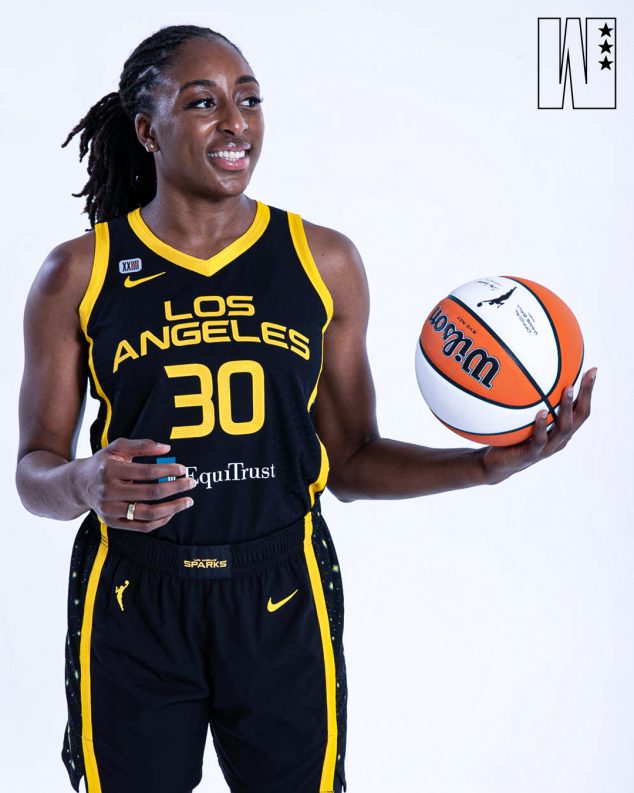
SLAM: This group has been a major factor in making the League what it is today. What does that mean to you?
SUE: For me, personally, I do realize that 25 years from now when people look back on the League, they’re going to think of our names when they think of the early years. Because I came into the League, I think in its fifth year, I don’t feel like a pioneer. I don’t feel like the Sheryl Swoopes and the Lisa Leslies and Rebecca Lobos, but I know years from now we’ll be kinda in that group. So, it’s interesting because a part of me feels lucky to be a part of the start and to have helped it grow along the way, but also, we’re still playing so we’re kind of part of this younger generation, too. At the same time, for me, personally, everything that I do now is definitely about younger generations and leaving the business of the WNBA in a better place so it can continue to grow.
SKY: That full circle moment, too. I was that girl in ’97. I was 7 years old when the League started so that was my first time not only seeing women play on TV, but women that look like me playing and being on a stage like that. I was that little girl, so to see it come full circle and to see how younger girls respond to us and how they’re taking to our game and want to be like us. Having that in mind, that full circle moment.
SLAM: What are the biggest changes you’ve each seen on the court?
DIANA: Stylistically, the game has changed tremendously. The way it looks, the way it functions, the way we play is night and day from when we came into the League. It used to be a more veteran, more physical League, where now it’s more young and more athletic. These kids are doing shit that we didn’t do until two years ago. They’re so much more advanced skill-wise as far as what they can actually do on the court and it’s impressive to see them working at their craft at such an early age.
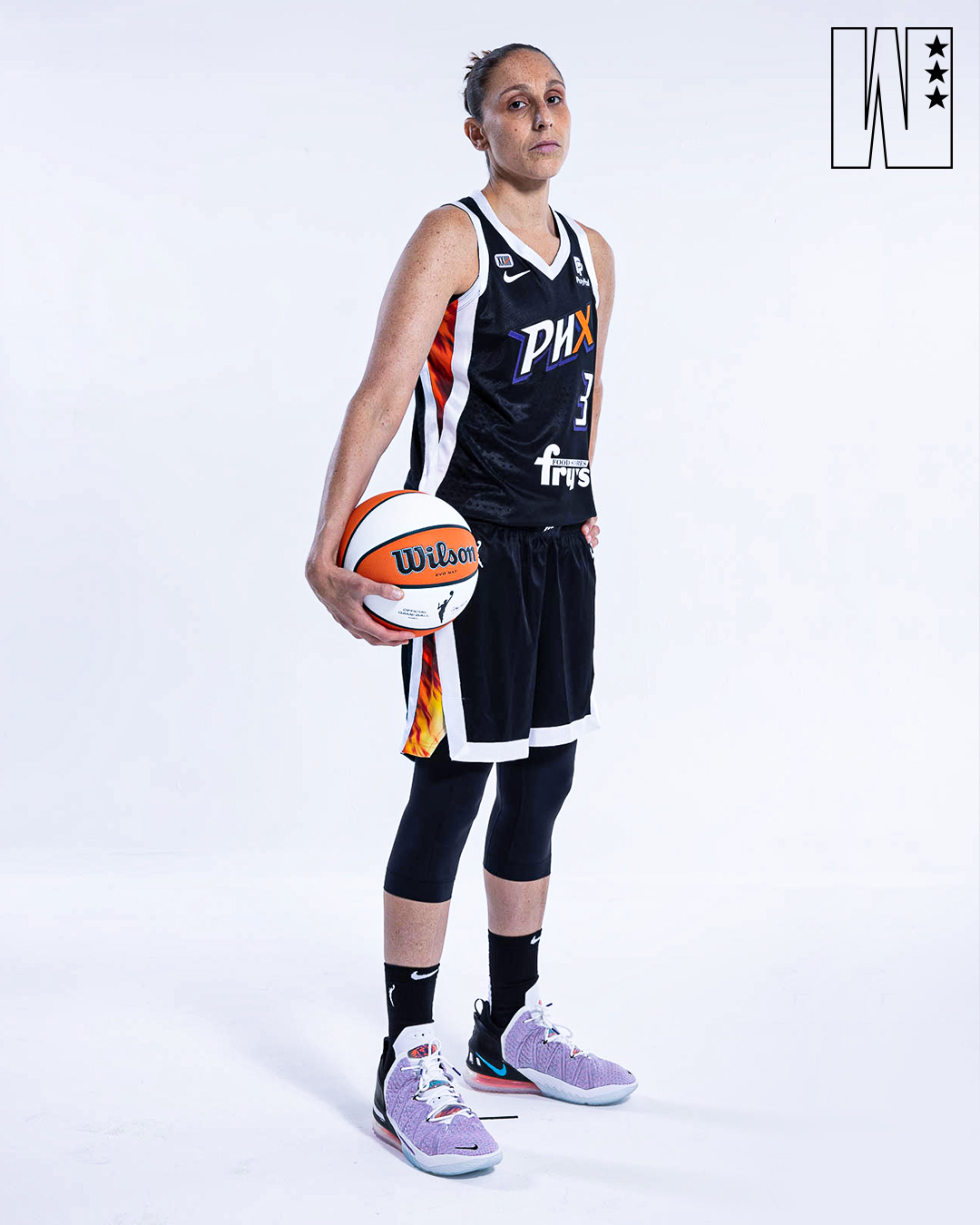
SUE: I agree. The two things I would add to D’s point, there’s been an evolution in the rules. I think now we’re almost ahead of the game in terms of the referees and the rules. At some point, when it peaks, it’ll be even better. Then the reality is, it’s 12 teams and 12 roster spots per team. This has been the biggest game of survival of the fittest you’re ever going to find anywhere in athletics. There’s no more competitive League because there’s not many spots. And, well, people like us won’t fucking retire, so you have new draft classes coming in every year and it gets more and more competitive. Which is great, because the product on the floor continues to get better, because it’s literally only the strong survive.
NNEKA: I was raised on teams where it was very fundamental, very conventional. When I came out of Stanford, we were running the triangle, so I was really good at my job. I think it’s interesting, Skylar and I were kind of in between generations a little bit. I always thought I was gonna be playing in the League, then overseas, then back to the League, and so on. Now I find myself in a position where maybe I don’t need to go overseas as much and I can work on my game a little bit more, so I can kinda lean in toward the newer generation. I’m really grateful to have the opportunity to be able to be with people like this group and get to work on my game and to add that dynamic aspect to the game as I’m also experiencing it on the court. D’s right, if you don’t work on something, you’re out. It’s moving fast and you have to keep up with it, you can’t wait for there to be expansion. You gotta stay sharp. I love it.
SKY: That was my thing coming to Phoenix. I knew I was coming with great players. I had to carry the load on my old team. Everybody knew I had to score points, get assists, be top 10 in these categories or it was going to be tough. Coming to Phoenix, I knew I was coming with the greatest player we had in our League, and I was coming with BG [Brittney Griner] who is one of the biggest stars in our League, because I am trying to fucking win. Let’s keep it 100. I’m playing this game because I want to win championships. MVP, that’s not something that’s in my mind, so it’s like, what do I gotta do for us to win? When I come on a team like this, I sacrifice a bit of myself for the greater good, and everybody eats. That wisdom, too, as a player you evolve, your mindset changes with maturity. Having the best teacher of experience, you can’t teach that.
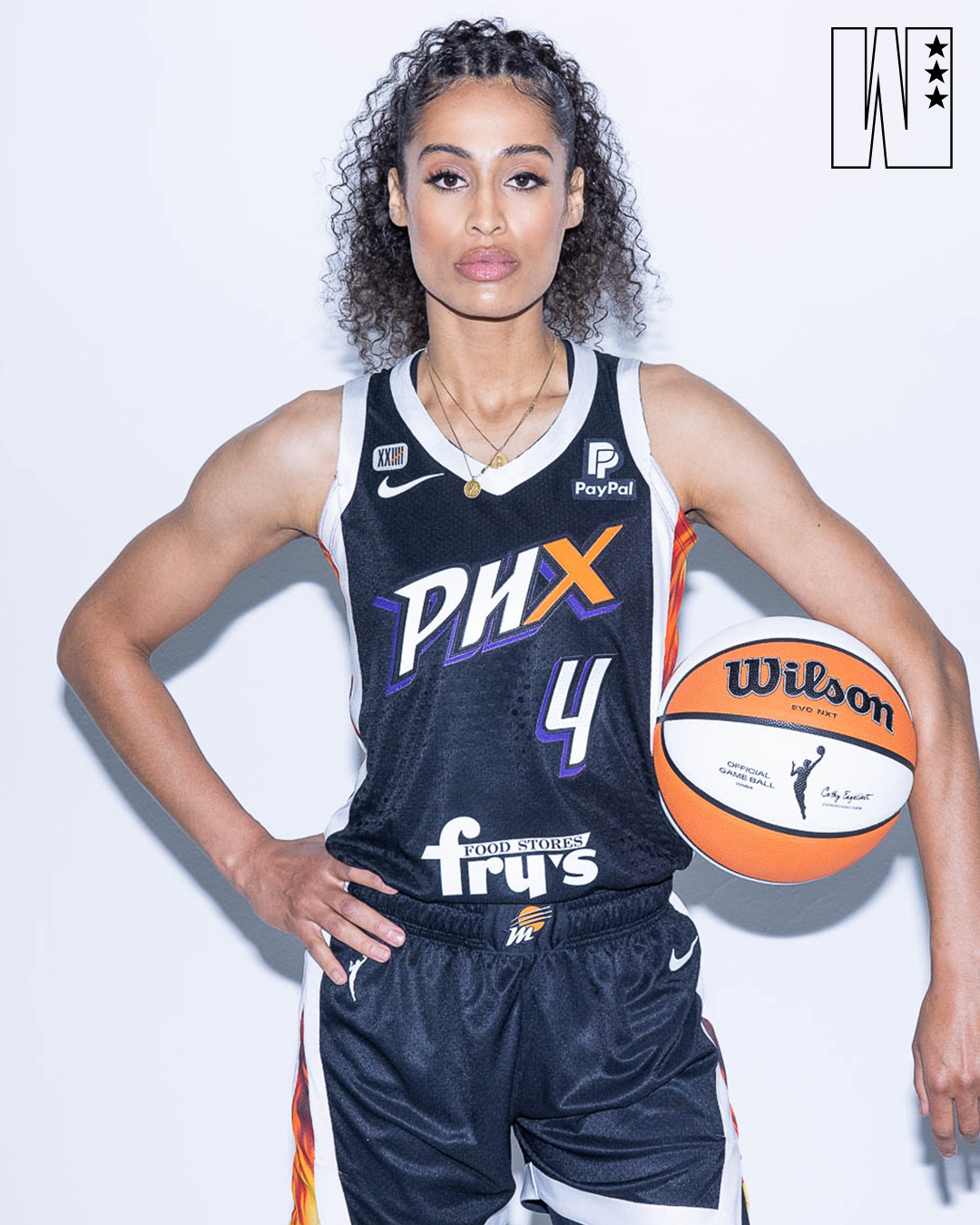
SLAM: What excites you the most about this next generation of women’s basketball players?
SKY: They are athletic as hell. I mean the way they’re dunking the ball, the finishes, the veer steps, it’s so creative. I’m seeing stuff that I’ve never seen before consistently. The skill level, the handles, the one-on-one skills, it’s amazing.
NNEKA: For me it’s the gall and the fearlessness. When I first came into the League, they were like, Oh, she’s a rookie, but now it’s not really so much that. You can say that yeah, they’re a rookie, but these kids are coming in…
SUE: Expecting, but in a good way.
SKY: Thinking of someone like Chennedy Carter or Arike [Ogunbowale].
NNEKA: Yeah, they’re like, I don’t care. I love that. I think that’s really great.
SUE: What excites me about the college players, even some high school players, they have legit followings that we didn’t have. The thing that is really exciting about it is that they’re gonna continue to build that. When they do get to the WNBA, they’re gonna take that with them. So, the 22-year-old guy who’s now following XYZ player becomes the decision maker and they’re out in the world talking about women’s professional basketball. It’ll be a different storyline.
SKY: The exposure is crazy. It’s insane.
SUE: Yeah, like Paige Bueckers as a high school kid was on the front of SLAM. That didn’t happen. Chamique [Holdsclaw] was the only person ever at that point. That changes narratives, that changes things. I think that’s pretty dope.
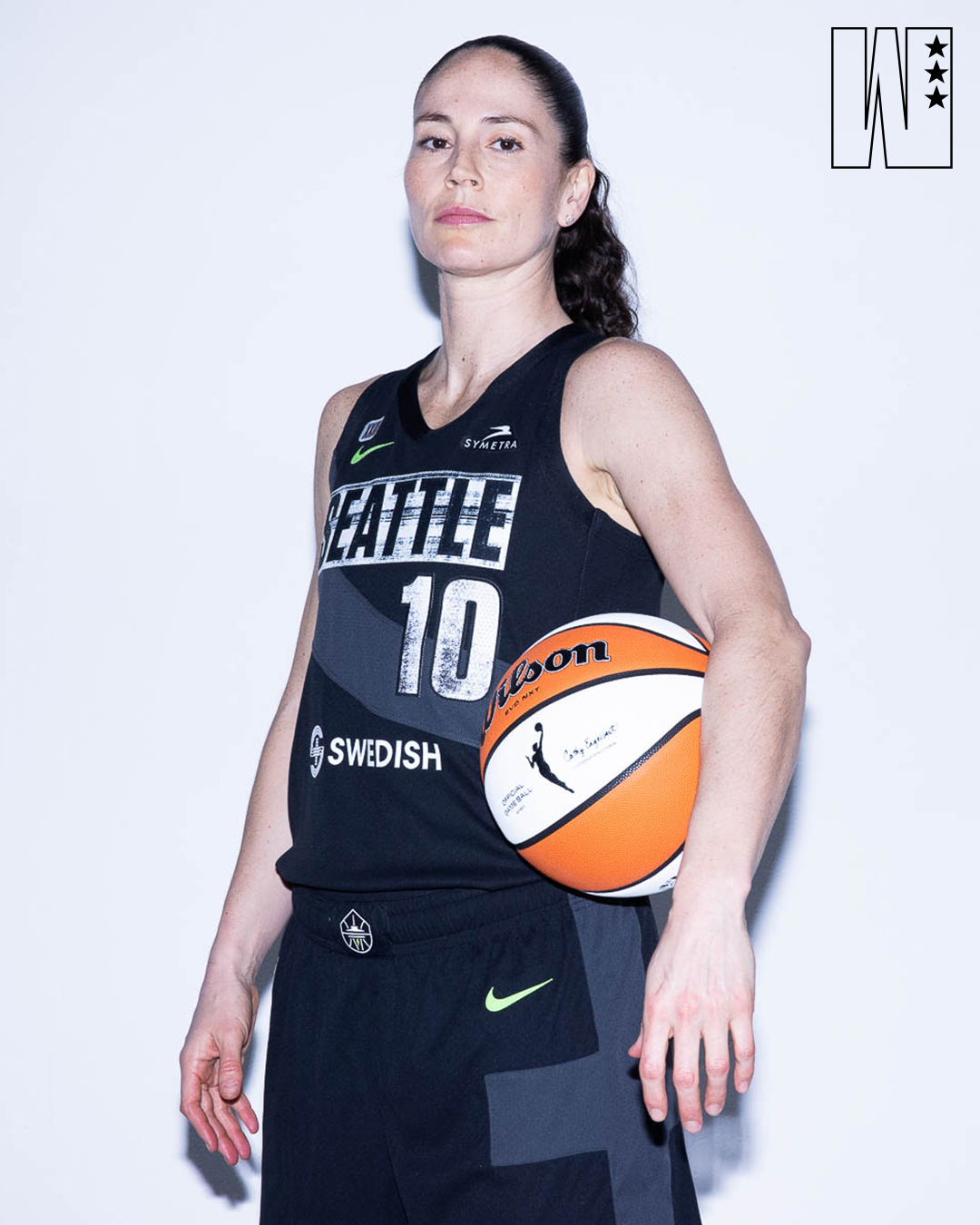
SLAM: For Sue and Diana, you both have accomplished so much in your careers. Is there anything that’s on your bucket list, career-wise, that you still want to accomplish?
DIANA: I don’t necessarily think it’s a championship or a record. It’s an internal motor that won’t stop. It isn’t necessarily physically or mentally, but there’s this motor running in me that won’t stop. Where that goes, I don’t know, but it’s not stopping.
SUE: For me, I make shit up. I’m like, I want to play in the new Key Arena. That’s my new bucket list. I’m making these things up, but I think that’s [D’s point] at the core of it.
DIANA: Sometimes I wake up and I say, Alright, dude, just give it a rest, and I can’t. I’m obsessed with it. On the car ride over with Nneka, I said, Man, my life is literally my family and basketball. I don’t have time for anything fucking else, and I wish it was like this 10 years ago.
SLAM: The power of the WNBA cannot be mistaken anymore. From changing the course of an election to helping remove and replace a team owner who went against what the women of the League stand for. What were those conversations to strategize and mobilize?
NNEKA: They weren’t easy conversations to have. To be honest, it went before even what we were faced with when it came to us even formulating a social justice council. We were having hard conversations before about what the bubble was going to be like. I mean, we’ve seen panels of “important conversations,” where people aren’t having them, but I can honestly say that we were having them. Whether it was me and Sue talking or me asking D, Hey, what’s up? Even when we had the all-player meeting, D stayed at the end and said, Yo, what the hell are we doing?
For us to be able to have those tough conversations, me asking Sky, Do you have resources for your family? It was more than us demonstrating what we had faced with the course of the election and such, it was real life shit that we were having to deal with. We took it day by day. One thing that never wavered was us letting people speak their mind. I think that’s what people don’t get. People think that the hard conversation needs to have a syllabus. No. You just need to make space for people to be comfortable to express what they need to express and then you really figure it out from there.
SLAM: One of the most emotional and trying moments of last season was when the League refused to play in protest of the shooting of Jacob Blake. What was that experience like for each of you?
SKY: It was insane. We had a conversation that day and we were kind of talking at shootaround and we were like, Do we play? We came together, it didn’t even feel right practicing. I talked to D, we talked to the team, and we ended up meeting together, asking, What do we really want to do? We want to make sure that we’re united in this. Basketball was secondary at the time. We felt like it needed to be a response to what had happened. There was no doubt in our mind, it was a unanimous decision. Everybody supported each other.
SUE: I think the beauty of the WNBA is that it’s not just about this year. What made us so ready and willing to step up were our past experiences. I can think back to 2016 when Minnesota wore their shirts first and then it went to New York and then Phoenix, then our whole League backed everybody. Looking back on that, we weren’t as organized as we were this year, but we kind of had to go through that in a way to understand, Wow, we’re organized and we’re all on the same page. The platform is bigger, the voice is louder.
Fast forward to last summer, that moment was heightened emotions, it was happening in real time. There’s a lot of people with a lot of opinions, rightfully so. The good news is that we’re all on the same page from a values standpoint. But there’s the conversation of how, how we are going to do it? I think what we learned from 2016 is, when we’re organized with it and we’re all on the same page, it’s much more powerful.
NNEKA: We weren’t going to have one game and not the other. There was a camaraderie through it all, even though people had different opinions about it. It was clear that we wanted to let people know things are more important right now and we needed to reset and understand we came to the bubble for a reason. Quite frankly, my opinion was we had a platform to not play because we were playing. I think that was something that people needed to understand as well.
DIANA: I made it really clear, we’re going to do all this shit and then play today? If there’s one day not to play, it’s today. To even have the conversation of maybe playing to me was absurd and I think that I made that really clear. Going back to what you guys said, fast forward a couple hours when we were in that only-players conference, you could tell there was fatigue and sadness, and it was across everyone’s face and across everyone’s demeanor. You felt let down by the world basically, by society, by the people that are supposed to protect you. There was a feeling of grief in a lot of ways. I think that moment was very clear to all of us.
SKY: We were already in the climate of coming to the bubble and George Floyd happened and then we dedicated our season to #SayHerName and trying to bring forward the women’s stories who have been lost. Trying to bring their stories to the forefront, to light
and then it just seemed like it was back-to-back. I know as a Black woman, it is tiring, and I was like, Hell no. We are not playing. That feeling, I’ve never felt like that in my life.
SLAM: We are now celebrating the 25th anniversary of the WNBA, the longest-standing women’s professional league of all time. Where do you want to see the League when it celebrates its 50th anniversary?
DIANA: Well, I would like to be on my couch in November, and instead of putting on the Lakers, I’d like to put on the Mercury.
SKY: You get that? And 30 teams.
NNEKA: For me, I always say this, I don’t really put a timeline on it. The only timeline I put on it is that I’m gonna be alive when this happens. I want to see the first million-dollar contract signed.
SKY: You gonna be commissioner next?
SUE: Yeah, she might be commissioner. You’re gonna be putting the contract in front of the player.
SKY: Yeah, manifest that.
SUE: I always joke about this, but you hear an older NBA player say, I didn’t make that money. They’re the disgruntled older player. I always say that I
hope that’s me one day. I hope I’m somewhere on my couch watching a game and I’m saying, I didn’t make a million dollars.
DIANA: In November?
SUE: Yeah, in November.
DIANA: You might be Kenny Smith and I gotta be Charles Barkley!
SUE: But yeah, jokingly, I want to see a million-dollar contract and say, Dang, I didn’t get to have that. But simultaneously, the four of us, we will have played a part in that contract.
NNEKA: You can definitely say that we did that.
—
Portraits by Atiba Jefferson.
SLAM 232 is available now in these exclusive gold and black metal editions. Only 60 copies are available in black, and 94 are available in gold.
Shop here.
